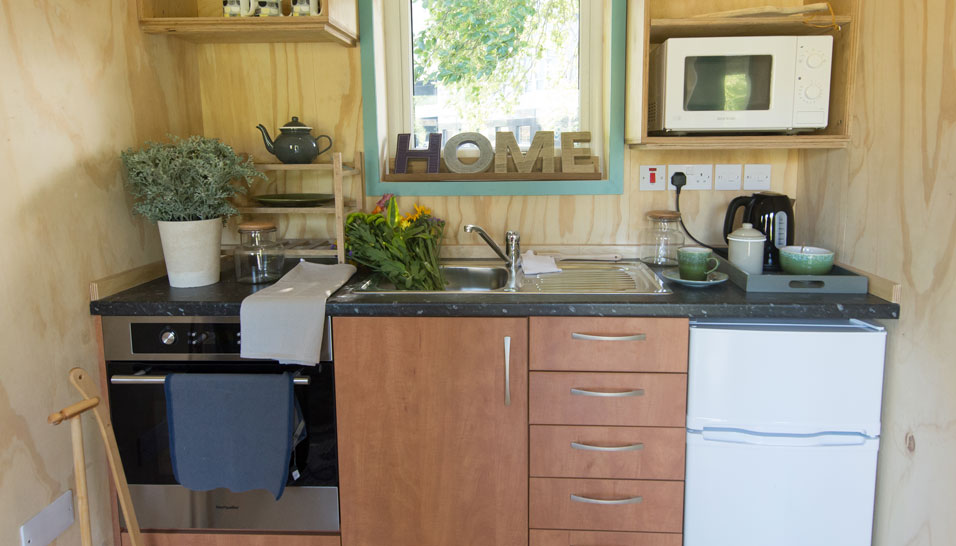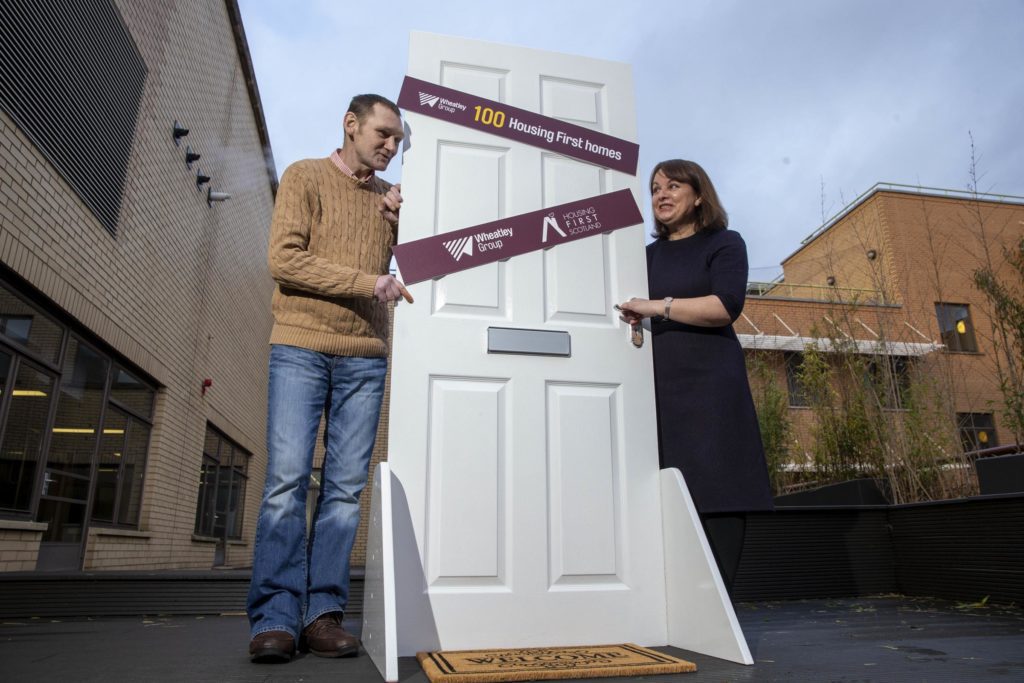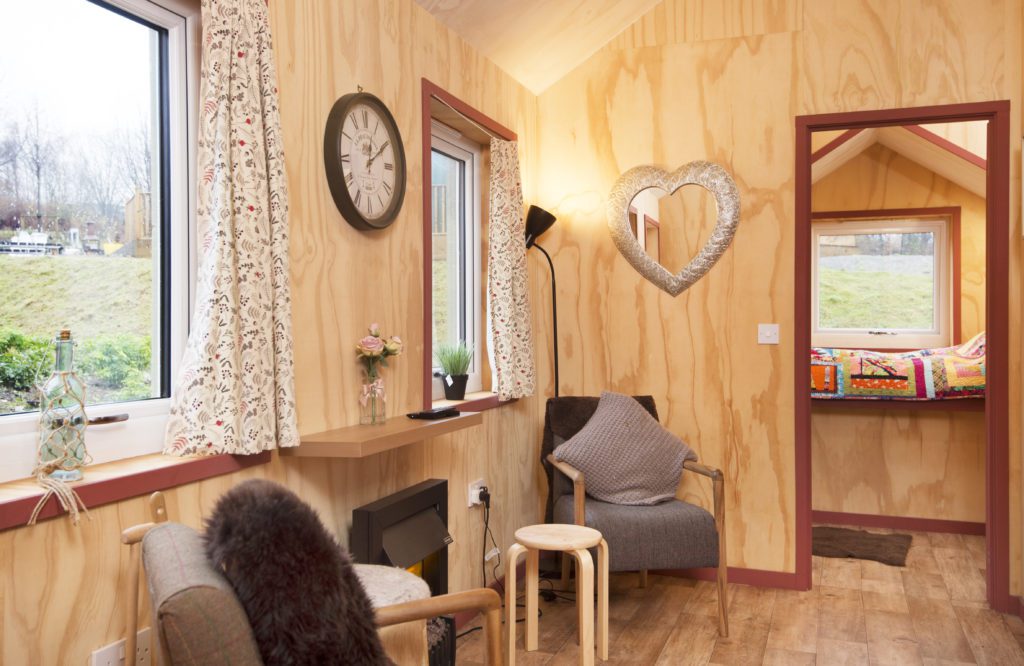In 2018, Social Bite played a pivotal role in introducing and scaling the compassionate, transformative Housing First approach across Scotland. The model had been proven internationally and we wanted to replicate its benefits at home. Now, many years later, Housing First has been successfully adopted across Scotland.
What is Housing First and why is it important in ending homelessness?
Housing First is grounded in the belief that housing is a basic human right. It provides stable, permanent housing first and foremost, and then addresses other issues – like addiction, mental health and employment – through ongoing, wraparound support.
Housing First turns the existing homelessness system on its head. People are given a safe home of their own and a support structure to help them sustain their tenancy, re-integrate into society, and ultimately thrive.
Today, Housing First is a collaborative approach to ending homelessness involving voluntary organisations, the Scottish Government, Local Authorities and academic partners.
The launch of Housing First in Scotland was a key moment for the movement to end homelessness. Since its implementation, hundreds of people affected by homelessness who have taken part in the programme have experienced significant improvements in mental health, physical wellbeing, and overall quality of life.
What was Social Bite’s involvement with Housing First?
We knew the Housing First model was tried and tested in other countries, such as Finland, and we wanted to see it implemented in Scotland. So in 2017, Social Bite founded the Housing First Pathfinder. The project lay the groundwork for a larger shift in government policy towards “rapid rehousing,” which made quickly moving people out of temporary accommodation and into permanent homes the standard approach.
It was typical of our entrepreneurial mindset: carry out a smaller pilot project to test, refine and learn from an idea, and then champion its success so that the idea would be adopted more widely. In this case, the Pathfinder was essential to expanding Housing First across Scotland.
As part of this, we commissioned Glasgow Homeless Network (GHN) to co-ordinate delivery of the Pathfinder and the Corra Foundation to support the process by selecting organisations to run Housing First in its first five locations.
Furthermore, Social Bite made four significant contributions to launching the programme:
- Commissioning on addressing homelessness in Scotland, which showed there was a requirement for better support for people with complex needs.
- Providing funding to kick-start a three-year pilot project, called the Housing First Pathfinder, which would transform the model from theory into reality.
- Securing a commitment from housing providers of more than 800 properties for vulnerable people affected by homelessness and other issues.
- Representing the third sector alongside other charities and lobbying for change on the Homelessness and Rough Sleeping Action Group (HARSAG), which was established to provide recommendations on how to end homelessness and rough sleeping in Scotland.
Research
After Sleep in the Park in 2017, some of the funds raised by our amazing supporters were invested in research by Heriot Watt University. Their report, “Eradicating ‘Core Homelessness’ in Scotland’s Four Largest Cities,” examined the best ways to help people with complex needs who were experiencing homelessness, and found strong support among key stakeholders for expanding the Housing First model.
Funding
The following year, thanks to the incredible support for Sleep in the Park in 2018, we were able to put an investment of £3 million into the Housing First Pathfinders project, which ran from 2019 to 2022. The Pathfinder was like a large pilot programme, based on the research Social Bite had commissioned.
“The Housing First programme is the result of a major collaborative effort which started with 8,000 members of the public sleeping out in Princes St Gardens.” – Josh Littlejohn, co-founder, October 2018
The Pathfinder was a significant step forward in a journey that began a decade earlier, when Turning Point Scotland ran a small Housing First pilot project in Glasgow. It would test Housing First in Glasgow, Edinburgh, Aberdeen, Dundee and Stirling, laying the groundwork for making the model a reality.
Homes & lobbying
For the Pathfinder to be successful, a lot of properties were needed to house around 830 eligible participants. Social Bite’s co-founder Josh was instrumental in securing pledges from housing associations, including an early commitment of 200 properties from the Wheatley Group.
Josh’s voice was also part of a chorus of charities on Scottish Government’s Homelessness and Rough Sleeping Action Group, which held the Government to account and kept the Housing First project on track.
Who was involved in the Pathfinder?
Groups of leading housing and support providers in five locations across Scotland delivered the Housing First Pathfinder. Their commitment and contributions ensured the success of the pilot.
Glasgow was led by Turning Point Scotland, with a consortium comprised of Simon Community Scotland, The Salvation Army and Loretto Care.
Edinburgh was led by Cyrenians, with a consortium comprised of Turning Point Scotland, Rock Trust, Streetwork, Bethany Christian Trust, Gowrie Care and Barony Care.
Dundee was led by Transform Community Development, with a consortium comprised of Salvation Army Dundee, Dundee Survival Group (DSG) and Addaction.
Aberdeen was led by Aberdeen Cyrenians, with a consortium comprised of Aberdeen Foyer, Turning Point Scotland, Aberdeen City Council Housing Support Department and Aberdeenshire Council.
Stirling was led by Loretto Care with Barony Care offering support.
How does Housing First help the mission to end homelessness?
We believe everyone should have a safe place to call home. It’s essential if we want to create a society where we all can reach our full potential. Viewed through that lens, we saw Housing First as the dawning of a new era in how Scotland responded to the systemic issue of homelessness.
We wanted to create a structural shift away from the use of unsuitable temporary accommodation, which perpetuates repeat homelessness, towards people being housed as quickly as possible in permanent homes with appropriate wraparound support.
When the Pathfinder launched, the wider goal was to act as a catalyst for the adoption of Housing First. If it was adopted across all 32 Scottish local authorities, it would become the default solution to tackling systemic, repeat homelessness for people who are most vulnerable.
A total of £9.5 million was needed to make the theory behind Housing First a reality in Scotland. Alongside Social Bite’s funding, the Merchants House of Glasgow also made a major contribution, and Scottish Government officially backed the programme. They pledged £4m million to the first two years and an additional £2.5 million for year three, to support the transition to local authority mainstreaming of rapid rehousing.
This was a significant policy shift in how homelessness was addressed at the local government level. Each local authority was required to outline how they would reduce the use of temporary accommodation and increase the availability of permanent housing solutions. The goal was to ensure that homelessness was brief, rare, and non-recurrent.
Of the government’s £6.5m funding pledge, Josh said,
“The Scottish Government have demonstrated a commitment that will see Scotland become by far the largest provider of Housing First in the UK and one of the largest in Europe. What this means in reality is that 830 people will be helped off the streets into housing with support and we will have taken a major step forward in restructuring how we respond to homelessness as a society. In my view, that amounts to a game changer when it comes to tackling the issue of homelessness in Scotland.”
What happened with Housing First and where is it at today?
The Pathfinder concluded after three years, in March 2022. The programme had demonstrated the effectiveness of the Housing First approach in providing stable, long-term housing for individuals with complex needs. Most Pathfinder participants were able to maintain their tenancies, with sustainment rates consistently above 80%.
A permanent home also allowed participants to focus on positive mental health improvements, which in turn reduced the use of emergency services, temporary accommodation, criminal justice services, and other crisis interventions. The Pathfinder proved Housing First was a financially sustainable model for addressing homelessness. Significant savings could be made to the public purse after an initial set-up and transitional period of approximately two years.
The approach was widely supported and clearly had the potential to be scaled across Scotland, so Housing First was adopted by Scottish Government as a key method of addressing homelessness in Scotland. Social Bite worked with local and national government to ensure that the funding for Housing First was ultimately mainstreamed.
First Minister at the time, Nicola Sturgeon, said:
“Many people who become homeless or end up sleeping rough have complex needs that require specialist support as well as a house. Traditionally the approach has been to provide support and get a person ‘tenancy ready’ before giving them a house. But that can mean they spend long periods of time in temporary accommodation, making it harder for them to address the other issues they face.
“We want to change that, which is why we are working with Social Bite and others to invest in and expand Housing First to make it a key element of all homelessness services in Scotland. It is our priority to get a person into settled accommodation first, so they can then access support from the security of their own home.
“Now is the time for action, and to end homelessness in Scotland once and for all.”
Today, Housing First has been implemented by all but four local authorities in Scotland. (And these four only don’t follow the model because of their rural populations, which mean homelessness is experienced differently.) Housing First is the default option for housing people in Scotland affected by homelessness who are also dealing with traumas, addiction and mental health issues. The Scottish Government continues to fund Housing First and reports on statistics.
Ultimately, Housing First is a support intensive but cost-effective solution, which helps participants to break the cycle of homelessness and allows local authorities to focus their time and budgets on other strategic solutions to homelessness.
Is Social Bite still involved with Housing First?
After the Housing First Pathfinder finished, we championed the expansion of the programme in Scotland to new areas beyond the initial Pathfinder locations. We’ve also encouraged innovation within the Housing First framework, including more intensive support for people who might need it, and we’ve to gather data that could inform future policy.
Social Bite’s involvement in the direct delivery of the Housing First programme ended in March 2022 when it was mainstreamed into local authorities for delivery. It’s a part of our legacy now.
Housing First was a significant step towards achieving our mission to end homelessness. We continue to advocate for the model, including raising awareness and pushing for policy changes that support the Housing First approach. Having seen the successes of Housing First in Scotland, we’d welcome the opportunity to discuss the adoption of Housing First in the rest of the UK.
How do Social Bite’s villages work alongside Housing First?
Around the same time as the Housing First Pathfinder launch, Social Bite opened its first village in Granton, Edinburgh in 2018. Housing First is a permanent housing solution, whereas Social Bite villages are an alternative form of temporary accommodation. Homelessness is complex and different people experience it in different ways, so more than one solution is needed. Each innovation has a part to play in breaking the cycle of homelessness.
The idea for the village came from conversations with people we worked with and people who used Social Bite’s free food service. They told us about the conditions in temporary accommodation, which can be appalling – cold and damp, without locks on doors or cooking facilities, and with strict rules, often including no pets. So we devised an alternative for people experiencing homelessness who don’t have complex needs, or for whom community is essential to their recovery. In these cases, a Social Bite village can be the best possible living environment. The villages also demonstrate that temporary accommodation doesn’t have to be expensive, isolating and poor quality.
When the system’s broken, innovation is essential. Alongside Housing First, the Social Bite villages show that taking a person-centred approach to ending homelessness is the best way to design solutions that work.
How is Housing First different to temporary accommodation?
Housing First is a long-term solution. Too often, extremely vulnerable people, many with complex needs, find themselves sleeping rough in between temporary accommodation. Or they’re left unsupported in places where they’re isolated, unsafe, and become de-skilled because the facilities are inadequate.
The aim is to get people into a secure home and away from dangerous situations such as the street or other insecure settings where they’re vulnerable to abuse.
Unlike temporary accommodation, Housing First comes with support. The support takes a person-centred approach in which help evolves with the needs of the individual. Services commit to long-term provision with the aim of promoting self-worth, positive social networks, community integration and meaningful occupation through work and volunteering. This will include help with living skills, paying bills, cooking, mental health and addiction issues. There is no end date to support. The main aim is stability and preventing repeat homelessness.
Referrals usually come from organisations that are working on the frontline of homelessness. Eligibility for Housing First is not contingent on any conditions other than willingness to maintain a tenancy. No-one will lose their home if they disengage or no longer need support. If for whatever reason a tenancy fails, individuals will be supported to acquire and maintain a new home or supported into other accommodation.




